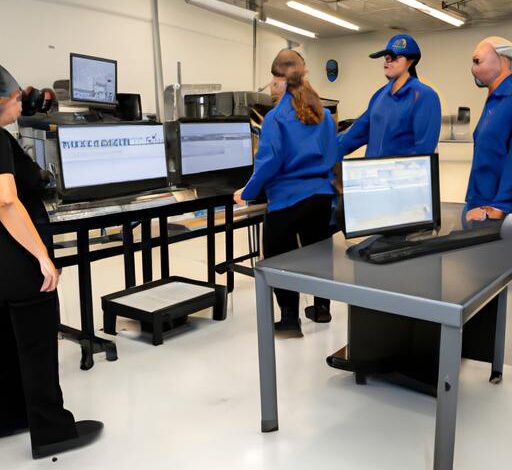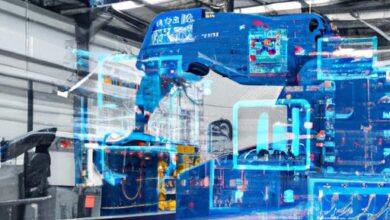Industrial 4.0 Training: Empowering Industries for the Future

In this rapidly evolving technological landscape, industries worldwide are undergoing a paradigm shift with the advent of Industrial 4.0. The integration of advanced technologies such as Internet of Things (IoT), Artificial Intelligence (AI), Big Data, and Cloud Computing has revolutionized industrial processes, leading to increased efficiency, productivity, and profitability. To stay ahead of the curve, organizations and professionals alike are recognizing the significance of industrial 4.0 training.
Importance of Industrial 4.0 in today’s technological landscape
Industrial 4.0, also known as the Fourth Industrial Revolution, represents the convergence of digital and physical systems, transforming the way industries operate. With automation, connectivity, and data exchange at its core, Industrial 4.0 has the potential to revolutionize manufacturing, supply chain management, and various other sectors. It offers unprecedented opportunities for organizations to optimize operations, reduce costs, and enhance customer experiences. By embracing Industrial 4.0, businesses can gain a competitive edge and position themselves as industry leaders in the digital age.
Definition and scope of Industrial 4.0 training
Industrial 4.0 training encompasses a range of educational programs and courses designed to equip individuals with the skills and knowledge required to navigate the complex landscape of the Fourth Industrial Revolution. It aims to bridge the gap between traditional industrial practices and cutting-edge technologies, empowering professionals to harness the potential of Industrial 4.0. From understanding the fundamentals of IoT and AI to mastering data analytics and cybersecurity, Industrial 4.0 training covers a broad spectrum of topics that are vital for thriving in the digital era.
Benefits of undergoing Industrial 4.0 training
Undergoing Industrial 4.0 training offers numerous benefits for both individuals and organizations. For professionals, it opens up exciting career opportunities in emerging fields such as Industrial Automation, Robotics, and Data Science. By acquiring in-demand skills through specialized training, individuals can enhance their employability and future-proof their careers. On the other hand, organizations that invest in Industrial 4.0 training for their workforce can drive innovation, streamline processes, and maximize operational efficiency. With well-trained employees, companies can effectively implement and leverage the potential of Industrial 4.0 technologies, leading to improved productivity, quality, and overall business performance.
As we delve deeper into the realm of Industrial 4.0 training, we will explore the key concepts, available programs, industry implications, and the significance of upskilling the workforce. Join me on this insightful journey as we unlock the potential of Industrial 4.0 and witness its transformative impact on industries worldwide.
Understanding the Key Concepts of Industrial 4.0
The Fourth Industrial Revolution, or Industrial 4.0, is built upon a foundation of key concepts and technologies that are revolutionizing industries across the globe. Let’s delve into the core principles and explore the transformative power of these concepts.
Overview of the core principles and technologies of Industrial 4.0
At its core, Industrial 4.0 is driven by the integration of advanced technologies that enable automation, connectivity, and data exchange. These technologies include:
-
Internet of Things (IoT): IoT refers to the network of physical devices embedded with sensors, software, and connectivity, enabling them to collect and exchange data. By connecting machines, products, and systems, IoT facilitates real-time monitoring, remote control, and data-driven decision-making.
-
Artificial Intelligence (AI): AI encompasses a range of technologies and techniques that enable machines to simulate human intelligence. From machine learning algorithms to natural language processing and computer vision, AI enables automation, predictive analytics, and intelligent decision-making.
-
Big Data: With the exponential growth of digital data, organizations have the opportunity to extract valuable insights through the analysis of vast datasets. Big Data refers to the collection, storage, and analysis of large and complex datasets to uncover patterns, trends, and correlations that can drive informed decision-making.
-
Cloud Computing: Cloud Computing enables organizations to access and store data and applications over the internet, eliminating the need for on-site infrastructure. It offers scalability, flexibility, and cost-efficiency, allowing businesses to leverage powerful computing resources without significant upfront investments.
Exploring concepts such as Internet of Things (IoT), Artificial Intelligence (AI), Big Data, and Cloud Computing
As we dive deeper into Industrial 4.0 training, it becomes crucial to familiarize ourselves with the concepts of IoT, AI, Big Data, and Cloud Computing. These concepts are interwoven and work synergistically to enable smarter, more efficient, and agile industrial processes.
IoT enables the connectivity of devices and systems, facilitating real-time data exchange and remote monitoring. AI empowers machines to learn, adapt, and make intelligent decisions based on data analysis. Big Data provides the foundation for extracting valuable insights from massive datasets, enabling organizations to optimize operations and improve decision-making. Finally, Cloud Computing offers the necessary infrastructure and resources to store, process, and analyze vast amounts of data, unleashing the full potential of Industrial 4.0 technologies.
Significance of these concepts in transforming industrial processes
The integration of IoT, AI, Big Data, and Cloud Computing in industrial processes has the power to transform traditional practices, leading to increased efficiency, productivity, and innovation. Connected devices and real-time data exchange enable predictive maintenance, reducing downtime and optimizing asset management. AI-powered systems can automate complex tasks, enhance product quality, and optimize supply chain processes. Big Data analytics provides insights that enable organizations to streamline operations, identify market trends, and personalize customer experiences. Cloud Computing ensures scalability and accessibility, empowering organizations to leverage advanced technologies without significant upfront investments.
By understanding and harnessing the potential of these key concepts, individuals and organizations can unlock the transformative power of Industrial 4.0, paving the way for a future of enhanced productivity and sustainable growth.
Industrial 4.0 Training Programs and Courses
Overview of the various training programs available for Industrial 4.0
Industrial 4.0 training programs have emerged as a response to the growing demand for skilled professionals who can drive digital transformation within industries. These programs come in various formats, ranging from short-term workshops to comprehensive certification courses. They are offered by universities, online platforms, and specialized training institutes, catering to individuals with different backgrounds and skill levels.
Detailed analysis of the curriculum and modules covered in these programs
Industrial 4.0 training programs typically cover a wide range of topics to provide a holistic understanding of the technologies and concepts involved. The curriculum may include modules on IoT fundamentals, AI and machine learning, data analytics, cybersecurity, industrial robotics, and agile project management. Hands-on practical exercises, case studies, and real-world simulations are often incorporated to ensure practical application of the learned concepts.
These programs may also delve into specific industry applications, such as smart manufacturing, supply chain optimization, and predictive maintenance. By offering a comprehensive curriculum, Industrial 4.0 training programs equip individuals with the necessary skills and knowledge to tackle the challenges posed by the digital revolution.
Identifying the essential skills and competencies acquired through Industrial 4.0 training
Industrial 4.0 training fosters the development of essential skills and competencies that are highly sought after in the modern workplace. These include:
-
Technical Proficiency: Industrial 4.0 training equips individuals with technical skills required to navigate complex technologies such as IoT, AI, and data analytics. Proficiency in programming languages, data manipulation, and system integration are crucial for implementing and maintaining Industrial 4.0 solutions.
-
Problem-Solving Abilities: Industrial 4.0 training nurtures problem-solving skills, enabling individuals to identify inefficiencies, optimize processes, and make data-driven decisions. The ability to analyze large datasets and derive actionable insights is key to driving innovation and improving operational performance.
-
Adaptability and Flexibility: As technology continues to evolve, adaptability and flexibility become essential traits. Industrial 4.0 training instills an adaptive mindset, preparing individuals to embrace change, learn new technologies, and stay up-to-date with emerging trends.
-
Collaboration and Communication: Industrial 4.0 initiatives often involve cross-functional teams working towards a common goal. Effective communication, collaboration, and teamwork are emphasized during training, ensuring individuals can effectively contribute to interdisciplinary projects.
By acquiring these skills and competencies through Industrial 4.0 training, professionals can position themselves as valuable assets to organizations seeking to capitalize on the benefits of the Fourth Industrial Revolution.
The Role of Industrial 4.0 Training in Industries
Examining the impact of Industrial 4.0 on different industries
Industrial 4.0 has the potential to revolutionize various industries, fundamentally reshaping their operations and capabilities. Let’s explore some key sectors and how Industrial 4.0 training plays a vital role in their transformation:
Manufacturing:
Industrial 4.0 enables the concept of smart factories, where machines, systems, and processes seamlessly communicate and collaborate. Through the integration of IoT devices and advanced automation, manufacturers can achieve enhanced productivity, reduced downtime, and improved quality control. Trained professionals equipped with Industrial 4.0 knowledge can lead this transformation by implementing intelligent manufacturing systems and optimizing production processes.
Logistics and Supply Chain:
Industrial 4.0 technologies offer unprecedented visibility and control over the supply chain, enabling real-time tracking, predictive analytics, and efficient inventory management. From autonomous vehicles and drones to smart warehouses and inventory optimization algorithms, Industrial 4.0 training equips professionals to leverage these advancements and streamline logistics operations.
Healthcare:
In the healthcare sector, Industrial 4.0 paves the way for connected healthcare systems, remote patient monitoring, and personalized medicine. Through the integration of AI-powered diagnostics, wearable devices, and telehealth platforms, healthcare professionals can deliver better patient outcomes and improve operational efficiency. Industrial 4.0 training empowers healthcare professionals to navigate this digital transformation and harness the potential of these innovative technologies.
Understanding how trained professionals contribute to the implementation of Industrial 4.0 technologies
Trained professionals play a crucial role in the successful implementation of Industrial 4.0 technologies within industries. They possess the specialized skills and knowledge required to design, develop, and deploy these advanced systems. By understanding the intricacies of IoT, AI, data analytics, and cybersecurity, trained individuals can ensure the seamless integration and efficient utilization of Industrial 4.0 technologies. Their expertise enables organizations to overcome challenges and optimize the benefits offered by Industrial 4.0, ultimately driving growth and innovation.
Case studies of successful integration of Industrial 4.0 training in industries
Numerous organizations have successfully integrated Industrial 4.0 training into their operations, yielding remarkable results. Let’s explore a few notable case studies:
Automotive Industry:
Leading automotive manufacturers have embraced Industrial 4.0 training to enhance their production processes. By incorporating AI-driven robotics, IoT-enabled sensors, and data analytics, these companies have achieved significant improvements in efficiency, quality, and safety. The seamless collaboration between humans and machines, made possible by Industrial 4.0 training, has revolutionized the automotive sector.
Energy Sector:
In the energy industry, Industrial 4.0 training has enabled the implementation of smart grids, intelligent energy management systems, and predictive maintenance. By leveraging real-time data analytics and automation, energy companies can optimize resource allocation, predict failures, and minimize downtime. Industrial 4.0 training has empowered professionals in this sector to drive sustainability and efficiency through innovative energy solutions.
By exploring these case studies, we witness the tangible impact of Industrial 4.0 training in various industries. Trained professionals act as catalysts for change, driving the successful integration and utilization of these transformative technologies.
Industrial 4.0 Training for the Workforce
Identifying the Target Audience for Industrial 4.0 Training
Industrial 4.0 training is not limited to a specific industry or job role. It is essential for professionals across various sectors who aim to stay relevant and thrive in the digital age. Engineers, technicians, managers, data analysts, and even entry-level employees can benefit from Industrial 4.0 training. The target audience includes individuals who seek to understand and implement advanced technologies to drive innovation, improve efficiency, and create a competitive advantage for their organizations.
The Importance of Upskilling and Reskilling the Workforce for Industrial 4.0
The rapid integration of Industrial 4.0 technologies is reshaping industries, disrupting traditional job roles, and creating new ones. To meet the demands of this digital transformation, upskilling and reskilling the workforce is of paramount importance. By providing Industrial 4.0 training opportunities, organizations can equip their employees with the necessary skills and knowledge to adapt to changing technologies and evolving job requirements. It enhances employee capabilities, boosts engagement, and fosters a culture of continuous learning and growth.
Exploring Potential Career Opportunities and Growth Prospects for Trained Professionals
Industrial 4.0 training opens up a world of exciting career opportunities and growth prospects for trained professionals. As industries increasingly embrace digitalization, there is a rising demand for skilled individuals who can navigate and leverage Industrial 4.0 technologies effectively. Roles such as Industrial Automation Engineer, Data Analyst, AI Specialist, IoT Architect, and Cybersecurity Analyst are in high demand. These positions offer competitive salaries, job security, and the chance to shape the future of industries. By investing in Industrial 4.0 training, professionals can position themselves as valuable assets in the job market and embark on a rewarding career path.
As we continue to explore the impact of Industrial 4.0 training, we will delve deeper into the selection of the right training provider and the various programs and courses available. Stay tuned to discover how to make informed decisions and embark on a transformative journey towards Industrial 4.0 expertise.
Conclusion: Embracing Industrial 4.0 Training for a Digital Future
In conclusion, Industrial 4.0 training is no longer a mere option but a necessity for individuals and organizations aiming to thrive in the digital era. The Fourth Industrial Revolution has brought forth a wave of technological advancements that have the power to reshape industries and redefine the way we work. By embracing Industrial 4.0 training, professionals can equip themselves with the skills and knowledge needed to navigate this transformative landscape.
The importance of Industrial 4.0 training lies in its ability to bridge the gap between traditional industrial practices and cutting-edge technologies. It empowers individuals to embrace automation, data analytics, AI, and IoT, enabling them to unlock new opportunities and drive innovation within their respective industries.
For organizations, investing in Industrial 4.0 training for their workforce is a strategic move that can yield substantial benefits. Trained employees can contribute to the successful implementation of Industrial 4.0 technologies, leading to enhanced productivity, improved operational efficiency, and a competitive edge in the market.
As we move forward, the demand for professionals with Industrial 4.0 skills will only continue to grow. Organizations across industries are seeking individuals who possess the ability to leverage advanced technologies and drive digital transformation.
By undergoing Industrial 4.0 training, professionals can future-proof their careers and position themselves at the forefront of the digital revolution. The benefits of Industrial 4.0 training extend beyond personal growth and professional development; they have the potential to reshape industries, drive economic growth, and create a sustainable future.
So, are you ready to embrace Industrial 4.0 training? Equip yourself with the necessary skills, embrace the power of technology, and become a catalyst for change in the digital landscape. Together, let’s unlock the full potential of Industrial 4.0 and shape a future that is boundless, innovative, and prosperous.
Conclusion: So above is the Industrial 4.0 Training: Empowering Industries for the Future article. Hopefully with this article you can help you in life, always follow and read our good articles on the website: transfer.dulich3mien.vn


